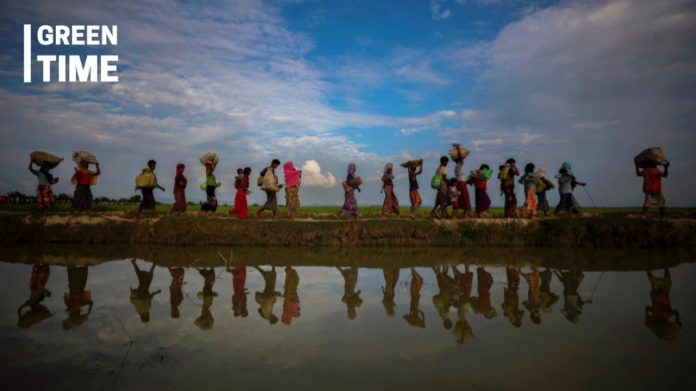Over the past 8–10 days, over 15,000 more Rohingya have fled Myanmar’s Rakhine State to seek refuge in Bangladesh as the conflict there intensifies. According to multiple sources, an additional 50,000 Rohingya are reportedly waiting to cross the border. The influx is being facilitated through various points along the Cox’s Bazar and Bandarban borders, including Ukhiya and Teknaf, often aided by smuggling rings via the Naf River.
Two officials from the International Organization for Migration and the Office of the Refugee Relief and Repatriation confirmed the reports, stating that many of the new arrivals are injured women and children who are receiving informal medical assistance. The conflict between the Myanmar government and the Arakan Army, which began in February, escalated in August, forcing thousands of Rohingya to flee. Reports of drone strikes, grenades, and bombings from warplanes have exacerbated the humanitarian crisis.
Zaheda Begum and Noor Jahan, two recently arrived Rohingya women, described the worsening conditions in Myanmar. “Both sides are using powerful grenades, mortar shells, and drone strikes. Bombs are being dropped from warplanes. Many people are being killed and injured, and several Rohingya settlements have been burned down,” Zaheda told The Business Standard. Smuggling rings are reportedly profiting from these desperate escapes, charging for safe passage across the Naf River.
While the situation in Myanmar deteriorates, Bangladeshi authorities are trying to manage the influx. Border Guard Bangladesh (BGB) Commander Lieutenant Colonel Mohammad Mahiuddin Ahmed disputed the reported number of new arrivals, claiming that approximately 4,500 Rohingya have been sent back in the last month. “The number of Rohingya infiltrations being reported is not accurate. There are some isolated infiltrations, and we are jointly repelling them,” he said.
Refugee Relief and Repatriation Commissioner Mohammad Mizanur Rahman emphasized the strain on resources in refugee camps and the need to curb new arrivals. “Those who are crossing the border are taking shelter with their relatives in various refugee camps. We do not have any record of how much infiltration has occurred,” Rahman noted.
Local sources, however, confirm that smuggling rings are actively facilitating these crossings, with more than 25 points along the border being used by the Rohingya to escape. As the situation remains tense, both Bangladeshi authorities and international organisations are monitoring the border closely, with concerns mounting about the growing humanitarian crisis.

